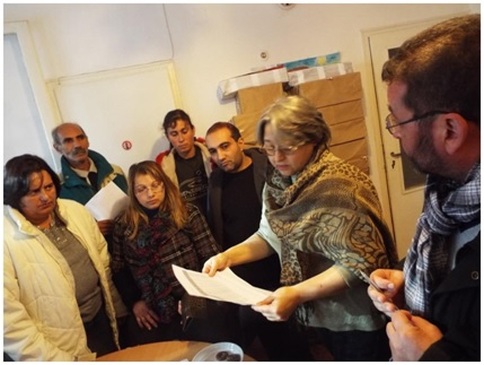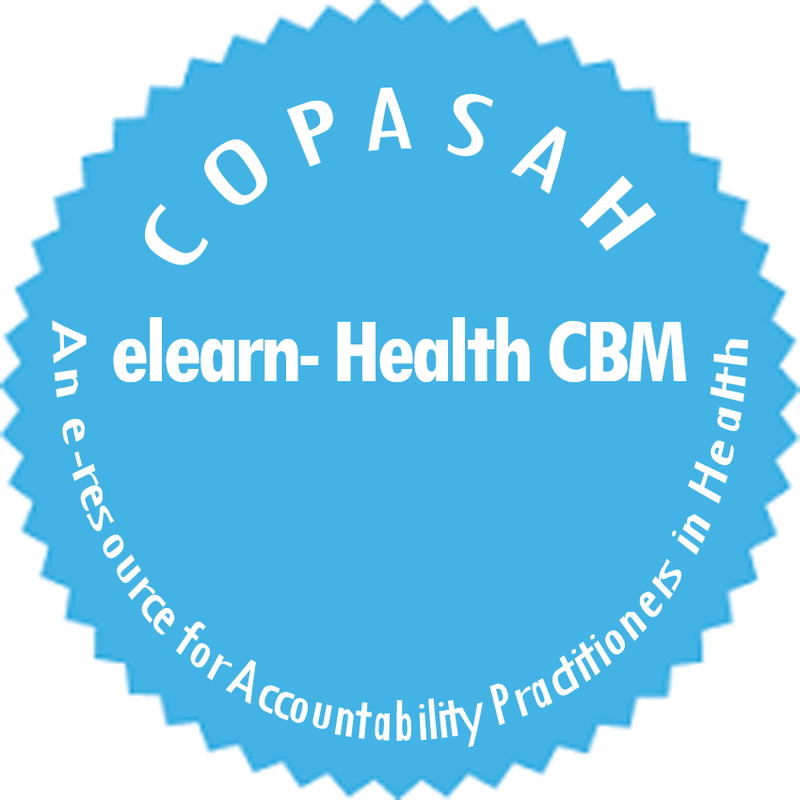
|
|
The Power of Community Initiative to Increase Access to Health Care:
The People of Roma Set theWay
The People of Roma Set theWay
|
Teodora Krumova
|
|
Background
The Roma Community in Bulgaria faces one of the most severe exclu-sions in access to health. The health status of Roma is signifi-cantly lower than that of the major-ity of the population of Bulgaria. Bridging the health gap requires intervention from both the Roma community and health system in-stitutions. Since 2011, the Cen-terAmalipe, a national Roma or-ganization in Bulgaria has been introducing Community monitor-ing for Roma women and children on healthcare services. This initia-tive is supported by Accountability and Monitoring in Health Initiative Program of Open Society Founda-tion. It is used as an approach for strengthening community-informed and community driven advocacy to improve health service delivery and health outcomes. The two rounds of monitoring are conducted every year, to examine women and children’s health indi-cators and the emergency medical services. The monitoring uses stan-dardized tools, to follow-through the changes that are observed in the health system with respect to the quality of services provided. It is due to the monitoring, commu-nity involvement and advocacy activities that there has been much progress made. |
Preparing for Community Monitoring Exercise
|
The result of the monitoring is shared with the com-munity and health institution staff to take further actions to better improve the different aspects of health care services provided to women and children. . Based on the results from each survey, an action plan is designed to address the harshest problem where the action items of recommendations made are implemented the next half year.
The approach of community de-velopment and involvement in monitoring health care services and follow-up advocacy actions have led to significant changes in the health status of the Roma com-munity. Besides, it has proved helpful in raising awareness among the Roma community about healthcare rights and health services. For instance between the first two rounds of community in-terventions, Roma women who could identify their local primary care physician increased from 83% to 94%. However, all the rounds of community survey reflected significant concerns that communi-ties encounter in their access to healthcare. For example, over 50% of women over 18 years did not have health insurance and so on.
The actual monitoring is preceded by various community mobiliza-tion activities in the field of health-care. Following this approach a campaign was organized by Center Amalipe and the Community Development Center in Pavlikeni to raise awareness and encourage people to restore their health insur-ance status. This was further ne-cessitated by a change in the Bul-garian health insurance law that introduced a change in the period of insurance for a person, after which insurance status would have to be restored. The order came into force on December 28, 2015, where the period of insurance was increased from three to five years. If this change was not imple-mented, then it would be practi-cally impossible to secure the health needs of the socially disad-vantaged people of Roma to get back again into the health system.
Preparing for Community Moni-toring Exercise
The campaign was based on the approach of shared responsibility. Center Amalipe with the support of the Fundamental rights agency (as part of the project LERI, implemented by the European Union Fundamental Rights Agency (FRA)) has offered ten of its most active community volunteers to cover half of their health insurance tax. In turn, they need to cover the other half and start paying their monthly health taxes regularly in oder to continue to be active, and to further engage intensively with community health issues. On December 21, Center Amalipe supported 10 active volunteers at the Community Development Cen-ter of Pavlikeni to restore their health rights. The approach for supporting persons without health insurance ensures their participation and engagement: they have to pay half of the amounts for the previous 3 years as well as the entire amount since January 2016. It also stresses the community engagement: every grantee is a volunteer of the Community Development Center - Pavlikeni or the local clubs in Byala cherkva, Batak and Stambolovo. They will continue their community volunteer work.
Conclusion
Changes in policies often reflect on the most vulnerable groups and sometimes this impact does not bring a positive development. In this sense, the increase of the years to be covered in order to get back into the health care system would result in a harsher exclusion of the most vulnerable groups such as Roma. At the same time a strong community development and monitoring approach towards the healthcare services and the changes in health policies might help these groups react timely and decrease the gap through improv-ing the access and quality of healthcare services.
The approach of community de-velopment and involvement in monitoring health care services and follow-up advocacy actions have led to significant changes in the health status of the Roma com-munity. Besides, it has proved helpful in raising awareness among the Roma community about healthcare rights and health services. For instance between the first two rounds of community in-terventions, Roma women who could identify their local primary care physician increased from 83% to 94%. However, all the rounds of community survey reflected significant concerns that communi-ties encounter in their access to healthcare. For example, over 50% of women over 18 years did not have health insurance and so on.
The actual monitoring is preceded by various community mobiliza-tion activities in the field of health-care. Following this approach a campaign was organized by Center Amalipe and the Community Development Center in Pavlikeni to raise awareness and encourage people to restore their health insur-ance status. This was further ne-cessitated by a change in the Bul-garian health insurance law that introduced a change in the period of insurance for a person, after which insurance status would have to be restored. The order came into force on December 28, 2015, where the period of insurance was increased from three to five years. If this change was not imple-mented, then it would be practi-cally impossible to secure the health needs of the socially disad-vantaged people of Roma to get back again into the health system.
Preparing for Community Moni-toring Exercise
The campaign was based on the approach of shared responsibility. Center Amalipe with the support of the Fundamental rights agency (as part of the project LERI, implemented by the European Union Fundamental Rights Agency (FRA)) has offered ten of its most active community volunteers to cover half of their health insurance tax. In turn, they need to cover the other half and start paying their monthly health taxes regularly in oder to continue to be active, and to further engage intensively with community health issues. On December 21, Center Amalipe supported 10 active volunteers at the Community Development Cen-ter of Pavlikeni to restore their health rights. The approach for supporting persons without health insurance ensures their participation and engagement: they have to pay half of the amounts for the previous 3 years as well as the entire amount since January 2016. It also stresses the community engagement: every grantee is a volunteer of the Community Development Center - Pavlikeni or the local clubs in Byala cherkva, Batak and Stambolovo. They will continue their community volunteer work.
Conclusion
Changes in policies often reflect on the most vulnerable groups and sometimes this impact does not bring a positive development. In this sense, the increase of the years to be covered in order to get back into the health care system would result in a harsher exclusion of the most vulnerable groups such as Roma. At the same time a strong community development and monitoring approach towards the healthcare services and the changes in health policies might help these groups react timely and decrease the gap through improv-ing the access and quality of healthcare services.
|
|
ABOUT AUTHORS
Teodora Krumova, is a Roma activist from Bulgaria. She holds Masters in History and Archaeology from Veliko Turnovo University, Bulgaria, and in medieval studies from Central European University, Budapest, Hungary. She is the Program Director of Center Amalipe in Bulgaria and one of the co-authors of the Roma Culture Classes Program, which is being implemented in more than 250 Bulgarian schools. She has also written a number of publications on Roma history and culture, textbooks on Roma culture, monitoring and evaluation reports on Roma-oriented policies and impact of national and European policies on the Roma community, and other scholarly publications. She is an evaluation expert for applying the model of community monitoring of healthcare services in the Roma community implemented by Center Amalipe in Bulgaria since 2011. To know more about Amalipe visit http://amalipe.com/ index.php?nav=home&lang=2
Teodora Krumova, is a Roma activist from Bulgaria. She holds Masters in History and Archaeology from Veliko Turnovo University, Bulgaria, and in medieval studies from Central European University, Budapest, Hungary. She is the Program Director of Center Amalipe in Bulgaria and one of the co-authors of the Roma Culture Classes Program, which is being implemented in more than 250 Bulgarian schools. She has also written a number of publications on Roma history and culture, textbooks on Roma culture, monitoring and evaluation reports on Roma-oriented policies and impact of national and European policies on the Roma community, and other scholarly publications. She is an evaluation expert for applying the model of community monitoring of healthcare services in the Roma community implemented by Center Amalipe in Bulgaria since 2011. To know more about Amalipe visit http://amalipe.com/ index.php?nav=home&lang=2








